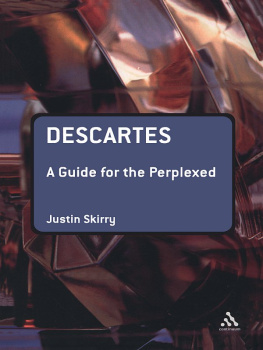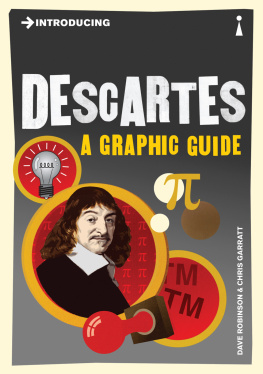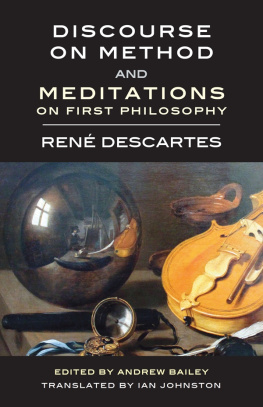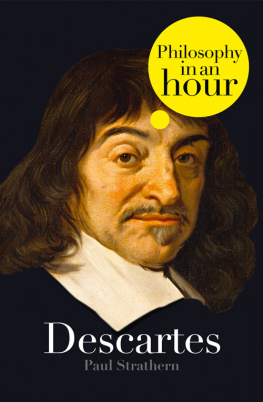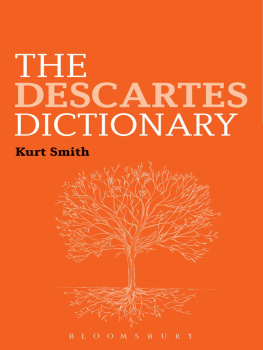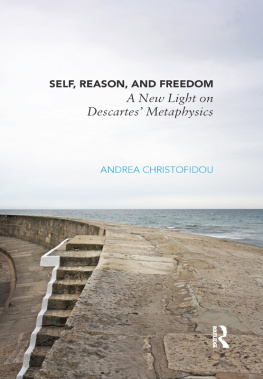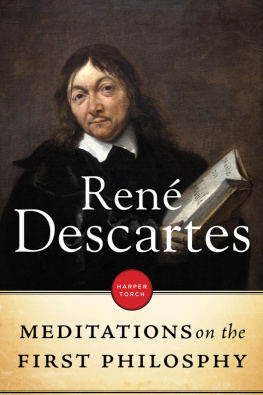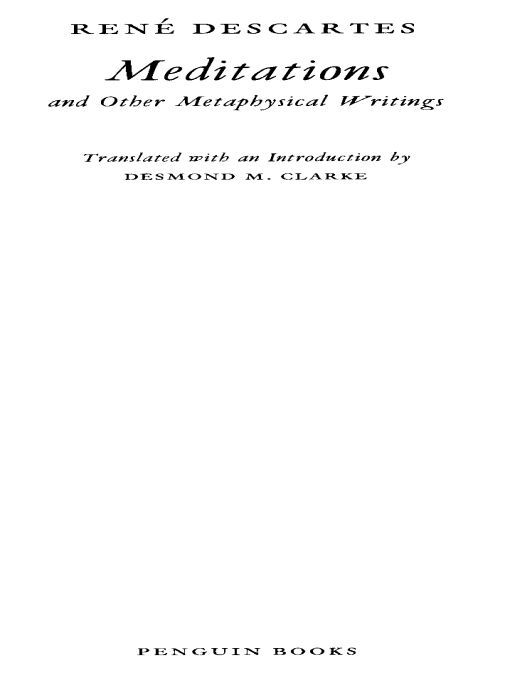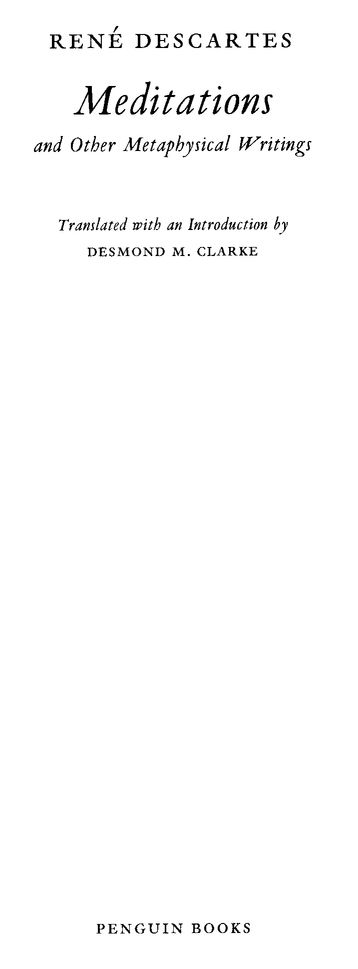Table of Contents
MEDITATIONS
REN DESCARTES was born in 1596 at La Haye (now called Descartes) near Tours, and educated at the Jesuit College at La Flche. Like many of his contemporaries he contested the value of an education based on Aristotelianism and, after leaving college, attempted to resolve the sceptical crisis of his age by devising a method of reasoning modelled on the rigour and certainty of mathematics. Despite claiming to avoid theological questions and stay within the scope of human reason, his writings involved him in numerous disputes with theologians of both the Catholic and (especially) the Reformed persuasion. In 1621, after a period spent in the Netherlands, Bohemia and Hungary as a soldier, he left the army and devoted himself to the study of science and philosophy. He retired to the Netherlands in 1628 and spent the next twenty-one years there, living and working in seclusion. Then in late 1649, after an invitation the previous year, he went to Sweden to take up a post instructing Queen Christina in philosophy. Descartes habit for many years was to rise not much before midmorning but the Queen wished to be tutored at five oclock in the morning, three days a week. This and the cold weather placed a severe strain on Descartes health and he contracted pneumonia, dying in Stockholm in early 1650, having only just begun to teach the Queen. His last words were reportedly a mon me, il faut partir (my soul, it is time to depart).
DESMOND CLARKE was educated in Ireland, France and the United States. He is Professor of Philosophy at the National University of Ireland, Cork, and a member of the Royal Irish Academy. His publications include Descartes Philosophy of Science (1982), Church & State (1984), Descartes Theory of Mind (Oxford, 2003), and two translations of early Cartesian authors: Poulain de la Barres The Equality of Sexes (1990), and Louis de la Forges Treatise on the Human Mind (1997). He is co-editor with Karl Ameriks of the series Cambridge Texts in the History of Philosophy. He is married, with two daughters, Nora and Ann.
This new Penguin Classics edition of Descartes includes this volume of metaphysical writings and a companion volume, Discourseon Method and Related Writings.
For Nora
The Penguin Descartes
Descartes publications extend over a very wide range. They include new developments in mathematics, scientific explanations of natural phenomena, and essays on what is usually classified today as philosophy. They were written in Latin when the issues discussed were philosophical in a technical sense and where the intended readership was limited to those who knew some philosophy. In other cases, they were written in French for a wider, non-academic audience. Besides the range and diversity of subject matter, Descartes produced a large volume of writings which extends to twelve large tomes in the standard edition by Adam and Tannery.
In selecting texts for the new Penguin edition, it was decided to focus on the two most famous Cartesian texts, the Meditations and the Discourse, and on the issues raised by them. The Meditations (1641) was written in Latin and, together with the Objections and Replies, represented a major contribution to seventeeth-century metaphysics. Descartes subsequently rewrote his metaphysics in a different style as Part I of the Principles (1644). He also began to take seriously objections to mind-body dualism and some of these were discussed in correspondence, especially with Princess Elizabeth. This volume includes selections from the metaphysical texts, and Descartes replies to another critic, the Comments on a Certain Manifesto (1648). Together they provide a representative sample of Descartes work on metaphysics, from 1641 to 1649.
Before writing extensively on basic issues in philosophy, Descartes had published his first book in 1637: three scientific essays on geometry, dioptrics and meteorology. He wrote a special preface for that publication, the Discourse on Method, which was intended as a summary statement of Cartesian scientific method. The Discourse provides the focus for a companion volume of texts, which includes the Rules and selected writings from correspondence and other publications in which Descartes clarified his theory of scientific method.
Acknowledgements
In preparing this translation, I had the benefit of consulting the work of others who have embarked on the same project in the recent past. In particular, I learned much from the French translation of the Meditations by Michelle Beyssade (Mditations mtaphysiques, Paris: Le Livre de Poche, 1990), the English translation by John Cottingham (ThePhilosophical Writingsof Descartes, vol. 2, Cambridge University Press, 1984) and the recent translation of the works of Descartes into Italian (Opere Filosofiche di Ren Descartes, ed. E. Lojacono, Turin: 1994). I also gratefully acknowledge a grant from the Arts Faculty Research Fund, University College, Cork, which made it possible to consult the first editions of the texts at the Bibliothque Nationale, Paris. Finally, Stephen Gaukroger was kind enough to read an earlier draft of my translation of the Meditations and made many helpful suggestions.
Desmond M. Clarke
Cork, 10 March 1997
NOTE TO CORRECTED EDITION
In this reprint, I have included a short paragraph which had been omitted on page 59. I am grateful to Meindert Kok for bringing it to my attention. I have also taken advantage of the reprint to make a number of other corrections and stylistic improvements.
July, 2000
Note on References to Descartes
The standard edition of Descartes works was prepared by Charles Adam and Paul Tannery at the beginning of the twentieth century and was published in twelve volumes (Paris: L. Cerf, 1897-1913). These have been revised under the general direction of the Centre National de la Recherche Scientifique, France and have been reissued as Oeuvres de Descartes, ed. C. Adam and P. Tannery (Paris: Vrin, 1964-74). All references in notes to Descartes works are to this latter edition, and are identified as AT, followed by the volume and page number.
Chronology
31 March 1596 Born at La Haye (since renamed Descartes), France
16 May 1597 Descartes mother died
1607-1615 Attended Jesuit College of La Flche
14 May 1610 Henry IV assassinated
9/10 November 1616 Graduated in Law, University of Poitiers
1618-19 At Breda, in the United Provinces
1618-48 Thirty Years War
1619-21 Travels to Poland and Germany
10 November 1619 Dreams of a great discovery at Neuberg (Bavaria)
1620 Bacon publishes the New Organon
March 1621 Hugo Grotius escapes from prison and goes into exile in
Paris
1623-28 Travels to Italy, and resides in Paris and Brittany
1627-8 Siege of La Rochelle
1628 Abandons writing the Rules for Guiding Ones Intelligence in Searching
for the Truth
1628-49 Lives at various places in the United Provinces
1633 Galileos Dialogue


